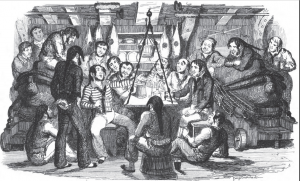Dripping wet, S. sits in a tavern populated with filthy sailors, poor beggars, prostitutes and one lone woman, reading a book along the wall. S. steals glances at her and wonders why a well-dressed, elegant woman would be in a place such as this. He waits, believing that “he must have some history in this establishment, or some other purpose for being here.” (18). Somehow, he knows that the printed “S” on the tavern that matches the “S” on the paper in his pocket must be meaningful. Meanwhile, a sailor bumps into him, remarking that S. is wet and S. replies, “You’re bleeding.” The sailor responds, “’S the truth.”
Jen and Eric’s Comments
Just as any other reader would wonder, Jen asks, “Has anyone ever complained about how good S’s intuition is?” Eric responds that “there was a critic named Edsel B. Grimshaw who famously ripped SOT to shreds.” Grimshaw* most likely believed that S.’s intuition seemed too good to be true; how can anyone know just based on a feeling where to go or sense that this peculiar woman is someone who can tell him about himself? After all, S’s memory is nonexistent, including facial recognition. In addition, S’s knowledge of this tavern with the matching symbol, “S” on it is inexplicable. As explained earlier in the chapter, he simply walks without any sense of direction, eventually finding himself at the tavern.
Eric argues, “Everything he experiences as intuition might be something he remembers from pre-amnesia life, but he can’t know for sure.” S’s strong instincts and intuition may originate from memories of his life before, muddled by the wall of amnesia that prevents him from being assured that his clairvoyance is warranted. The only evidence of connections that S has to his past life is his intuition, which seems larger than life.
Eric also notices the sailor’s words, “’S the truth.” Is the contraction of ‘is’ to ‘s’ a coincidence or did Straka deliberately use this phrase to imply something about “S?” Eric suspects it is “VMS saying that the S is real,” or that S “represents the truth.”
*Edsel B. Grimshaw is not a real author.


